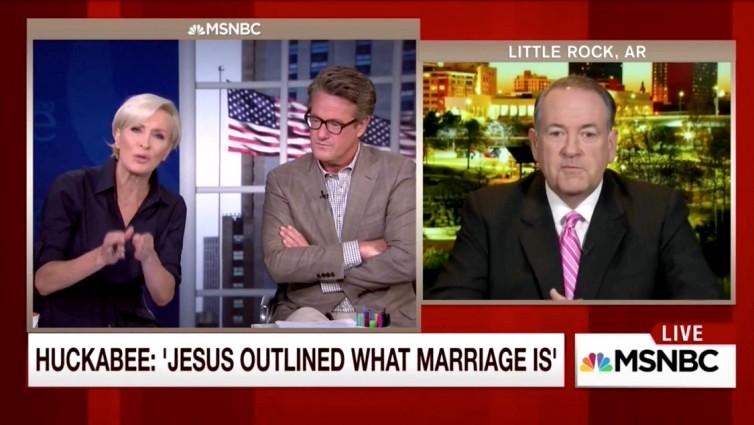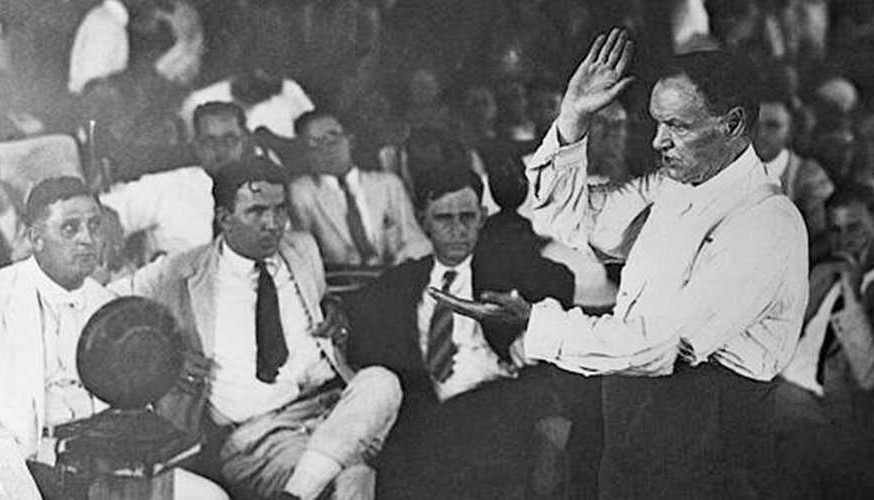
When a gay couple asked Rowan Country Clerk Kim Davis on who’s authority she was acting when she declined to issue the couple a marriage certificate, she responded “under God’s Authority.”
As a consequence, Federal Judge David L. Bunning jailed Davis after refusing to follow the orders of the court and her duty as an elected county official.
According to BloombergView (Sept. 3), in her legal brief, Davis “argued that she understood her oath of office ‘to mean that, in upholding the federal and state constitutions and laws, she would not act in contradiction to the moral law of God.’ Why? Because her oath included the words, ‘So help me God.’ ”
Bloomberg points out that “the oath of office prescribed by the U.S. Constitution doesn’t include those words. George Washington famously added them after taking the oath of office as president, and tradition has maintained them.”
Commenting on Davis, presidential candidate Ted Cruz said, “Those who are persecuting Kim Davis believe that Christians should not serve in public office. That is the consequence of their position.”
Presidential candidate Mike Huckabee tweeted: “Kim Davis in federal custody removes all doubts about the criminalization of Christianity in this country. We must defend #ReligiousLiberty!”
Both Cruz and Huckabee claim that Christianity is under criminal assault and that the courts offered no accommodation for her religious beliefs.
#That’sJustPlainWrong!
Judge Bunning told Davis that she would be released if she allowed the willing deputies in her office to sign marriage certificates in the clerk’s office in place of her. Davis initially refused, thus forcing her own religious beliefs on her office workers.
Last Tuesday, Davis was released from jail amid cheers and high-fives from Huckabee, Cruz, along with a small army of local supporters. Many believed that Bunning caved to local pressure.
That’s also wrong.
Before her release, Bunning admonished Davis that if she interfered in any way with the deputies in her office carrying out their official duties, she would return to jail.
Huckabee, who also happens to be an ordained Southern Baptist minister, tried to defend Davis’ actions with co-hosts Joe Scarborough and Mika Brezezinski on MSNBC’s Morning Joe (Sept. 9).
Scarborough, who was raised Southern Baptist, began by presenting a realistic hypothetical to Huckabee. “Jesus was much more explicit about divorce. So what would you think if a judge in Arkansas said ‘I’m not going to divorce these people, because Jesus Christ said that divorce is an abomination and that it is adultery’?”
Huckabee tried to pivot by talking about a Tennessee case where a judge refused to grant a divorce by citing the Supreme Court’s ruling on same-sex marriage. At that point, Brezezinski pressed the candidate to answer the question.
Brezezinski: Mike Huckabee… Would you support a clerk who would not give Kim Davis a third or a fourth marriage license?
Huckabee: There is a difference between a marriage between a man and a woman and a marriage between two men and two women.
Brezezinski: But you said…
Huckabee: Let me answer your question.
Brezezinski: I’d love it.
Huckabee: Okay. What we’re talking about is whether or not we can redefine marriage. Not whether or not a person can have more than one, because the law clearly says what people can do — they can have a divorce. We have laws for that.
WHOA! Stop the tape!!
Did Mike Huckabee say, “…the law clearly says what people can do”?
Yup!
I like Mike Huckabee, always believed him to be thoughtful and well-spoken. However, if he’s elected president, it’s troubling to think that he would ignore certain judicial decisions such as same-sex marriage based on his religious beliefs. And just as clearly, if he feels that “God’s Authority” authorizes him to ignore one law, what’s to stop him from ignoring others?
That’s not only wrong. It’s dangerous.
On September 12, 1960 then-presidential candidate John Kennedy addressed the Greater Houston Ministerial Association on the issue of his religion. Kennedy’s words are, perhaps, more relevant today than ever, and I would strongly encourage Senator Cruz and Governor Huckabee to seriously reflect on them.
After a brief introduction, Kennedy cuts to the issue many in America were concerned about: Would he allow his religious beliefs to dictate his policy decisions?
“…because I am a Catholic, and no Catholic has ever been elected president… it is apparently necessary for me to state once again not what kind of church I believe in — for that should be important only to me — but what kind of America I believe in.
“I believe in an America where the separation of church and state is absolute, where no Catholic prelate would tell the president (should he be Catholic) how to act, and no Protestant minister would tell his parishioners for whom to vote; where no church or church school is granted any public funds or political preference; and where no man is denied public office merely because his religion differs from the president who might appoint him or the people who might elect him.
“I believe in an America that is officially neither Catholic, Protestant nor Jewish; where no public official either requests or accepts instructions on public policy from the Pope, the National Council of Churches or any other ecclesiastical source; where no religious body seeks to impose its will directly or indirectly upon the general populace or the public acts of its officials; and where religious liberty is so indivisible that an act against one church is treated as an act against all.
“For while this year it may be a Catholic against whom the finger of suspicion is pointed, in other years it has been, and may someday be again, a Jew— or a Quaker or a Unitarian or a Baptist. It was Virginia’s harassment of Baptist preachers, for example, that helped lead to Jefferson’s statute of religious freedom. Today I may be the victim, but tomorrow it may be you — until the whole fabric of our harmonious society is ripped at a time of great national peril.
“Finally, I believe in an America where religious intolerance will someday end; where all men and all churches are treated as equal; where every man has the same right to attend or not attend the church of his choice; where there is no Catholic vote, no anti-Catholic vote, no bloc voting of any kind; and where Catholics, Protestants and Jews, at both the lay and pastoral level, will refrain from those attitudes of disdain and division which have so often marred their works in the past, and promote instead the American ideal of brotherhood.
“That is the kind of America in which I believe. And it represents the kind of presidency in which I believe — a great office that must neither be humbled by making it the instrument of any one religious group, nor tarnished by arbitrarily withholding its occupancy from the members of any one religious group. I believe in a president whose religious views are his own private affair, neither imposed by him upon the nation, or imposed by the nation upon him as a condition to holding that office.
“I would not look with favor upon a president working to subvert the First Amendment’s guarantees of religious liberty. Nor would our system of checks and balances permit him to do so. And neither do I look with favor upon those who would work to subvert Article VI of the Constitution by requiring a religious test — even by indirection — for it. If they disagree with that safeguard, they should be out openly working to repeal it.
“I want a chief executive whose public acts are responsible to all groups and obligated to none; who can attend any ceremony, service or dinner his office may appropriately require of him; and whose fulfillment of his presidential oath is not limited or conditioned by any religious oath, ritual or obligation. …
“I am not the Catholic candidate for president. I am the Democratic Party’s candidate for president, who happens also to be a Catholic. I do not speak for my church on public matters, and the church does not speak for me.
“Whatever issue may come before me as president — on birth control, divorce, censorship, gambling or any other subject — I will make my decision in accordance with these views, in accordance with what my conscience tells me to be the national interest, and without regard to outside religious pressures or dictates. And no power or threat of punishment could cause me to decide otherwise.
[And here’s the key passage that Davis, Cruz and Huckabee need to focus on:]“But if the time should ever come — and I do not concede any conflict to be even remotely possible — when my office would require me to either violate my conscience or violate the national interest, then I would resign the office; and I hope any conscientious public servant would do the same. …
“If I should lose on the real issues, I shall return to my seat in the Senate, satisfied that I had tried my best and was fairly judged. …
“But if, on the other hand, I should win the election, then I shall devote every effort of mind and spirit to fulfilling the oath of the presidency — practically identical, I might add, to the oath I have taken for 14 years in the Congress. For without reservation, I can ‘solemnly swear that I will faithfully execute the office of president of the United States, and will to the best of my ability preserve, protect, and defend the Constitution, so help me God.’ ”
In his second annual message to Congress, Lincoln said “The dogmas of the quiet past are inadequate to the stormy present. The occasion is piled high with difficulty, and we must rise with the occasion.”
It’s time for Cruz and Huckabee to follow the wisdom of their Republican icon.
Comments
Leave a Comment










That was the best post I have read. Thank you